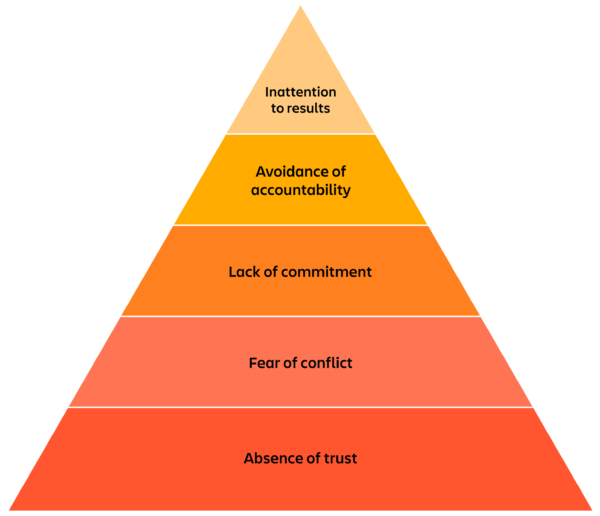LENCIONI MODEL
Another teamwork model we are going to mention to you was presented by American writer, Patrick Lencioni, in his book “The Five Dysfunctions of a Team”. You may be wondering how this model is different from Tuckman’s. Well, Lencioni’s model doesn’t exactly tell you what to do when leading or creating a team, but it identifies some of the problems that can appear during the process.

Lencioni's model
As you can see on the image below, there are 5 major dysfunctions of a team, which, if not addressed, can lead to a team’s failure.

Think of the matrix as a video game where you have to manage resources (your time) to get a high score. Each task is a mission that you must complete in a strategic way to win.
What does each dial mean?
ABSENCE OF TRUST
It comes from the unwillingness of the team members to be vulnerable within a group. The logic of this is that if members of the team can not be truly open with one another about their weaknesses and mistakes, it becomes impossible to build a foundation of trust. If there is no trust within a team, other problems are more likely to appear.
FEAR OF CONFLICT
When there is not enough trust between the team members, it becomes harder to engage into open debates of ideas – meaning that you would be more restrained and hesitant to point out ideas that could potentially be harmful for the team, just so that the team member who proposed them doesn’t take it the wrong way.
LACK OF COMMITMENT
Usually follows the Fear of Conflict. If, during discussion, you didn’t point out the ideas you think make no sense and just agreed to everything that was said, it will be hard to believe in the plan of action – and it is quite hard to commit to something you don’t believe in.
AVOIDANCE OF ACCOUNTABILITY
If you don’t believe in the plan of action and just want the task to be over with, you are less likely to call out your team members on actions and behaviors that might be counterproductive to the good of the team.
INNATENTION TO RESULTS
Is the result of avoidance of accountability. If you decide to focus just on your own task, without caring for what (or how) other members of your team are doing, you are putting your own, individual needs (recognition, ego, career development) above the collective goals of the team – which will, even if you do your task perfectly, lead to failure.
Those dysfunctions that we mentioned above usually build up on one another, but if even a single one of them is allowed to flourish, the teamwork will deteriorate. You can find more about these dysfunctions and how to address them one by one in your team here.

DICLAIMER
Funded by the European Union. Views and opinions expressed are however those of the author(s) only and do not necessarily reflect those of the European Union or the ANPCDEFP. Neither the European Union nor the ANPCDEFP can be held responsible for them.